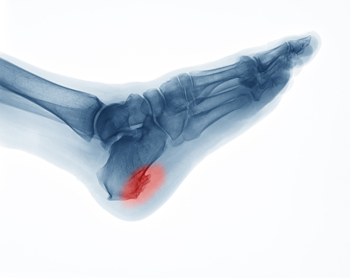
Heel spurs can affect a variety of different individuals. The condition is characterized by the formation of a bony outgrowth made up of calcium deposits. This outgrowth begins at the heel and then grows toward the arch of the foot or the plantar fascia. It can be very helpful to learn about some of the common symptoms of heel spurs in case you ever develop this condition. It is important to note, however, that every patient is different and experiences different symptoms. For example, some patients with heel spurs experience no symptoms. These patients will only discover that they have heel spurs after undergoing an X-ray. Other patients can experience great pain with heel spurs. Specifically, some people may experience a sharp, shooting pain in the heel area at the beginning of the day when first putting weight on their feet. A muddled pain in the heel can also be felt throughout the day. Some people with heel spurs might even experience a kind of heat coming from the affected heel in some cases. If you have heel spurs, you might experience some kind of inflammation and swelling as well. Symptoms of heel spurs are highly specific to each patient, so reach out to a podiatrist who can help with your specific case.
Heel spurs can be incredibly painful and sometimes may make you unable to participate in physical activities. To get medical care for your heel spurs, contact Jim Maxka, DPM from South Penn Foot & Ankle Associates. Our doctor will do everything possible to treat your condition.
Heels Spurs
Heel spurs are formed by calcium deposits on the back of the foot where the heel is. This can also be caused by small fragments of bone breaking off one section of the foot, attaching onto the back of the foot. Heel spurs can also be bone growth on the back of the foot and may grow in the direction of the arch of the foot.
Older individuals usually suffer from heel spurs and pain sometimes intensifies with age. One of the main condition's spurs are related to is plantar fasciitis.
Pain
The pain associated with spurs is often because of weight placed on the feet. When someone is walking, their entire weight is concentrated on the feet. Bone spurs then have the tendency to affect other bones and tissues around the foot. As the pain continues, the feet will become tender and sensitive over time.
Treatments
There are many ways to treat heel spurs. If one is suffering from heel spurs in conjunction with pain, there are several methods for healing. Medication, surgery, and herbal care are some options.
If you have any questions feel free to contact our office located in Hanover, PA . We offer the latest in diagnostic and treatment technology to meet your needs.
